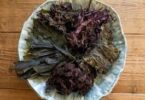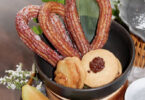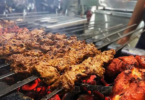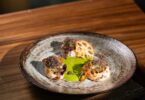Panna Munyal
A group of 16 diners are sitting around a table set with crystal candleholders and patterned plates. Evocative Arabic tunes — from Ya Zaman by Mike Massy to Magic Marrakech Lounge Music by Hobbi Lak — play in the background as they prepare for the Palestinian feast ahead.
However, guests are first served a story — one of many shared this evening. “When I was a child, my dad used to force us to pick olives,” says chef Ahmed Halawa, who hails from Nablus, Palestine.
“At the time, we didn’t appreciate it because we would rather have spent our time playing. But he would make us do it, then take us to the pressing house to see the olives being cold-pressed right in front of us.
“We’d each take a loaf of bread that we could put directly under the tap from which the olive oil poured out and eat it fresh. In retrospect, nothing can beat that culinary experience, nor the smell, the taste or the quality of the oil.”
On that delectable note, we dig into the musakhan rolls laid out in front of us, one of four starters in chef Halawa’s supper club this evening. The dough is soaked in olive oil and lavishly sprinkled with sumac, both products are sourced from Palestine by the chef. “It’s difficult to procure, but the quality makes it worth it,” says the former marketing consultant.
Chef Halawa has been hosting supper clubs since 2019, including the Full Life one he’s currently doing in collaboration with Deliveroo, all proceeds of which will be used to purchase food boxes for Emirates Red Crescent.
:quality(70)/cloudfront-eu-central-1.images.arcpublishing.com/thenational/Q4ZDY7GHKZHQNCU45HC75S4NGU.jpeg)
While he enjoyed his demanding job in corporate communications for many years, he says he was left feeling like something was missing. As a result, he started cooking for friends, acquaintances and, eventually, strangers over the weekend.
“I was working extra, but it energised me. Everyone has some free time and it’s up to you how you use it,” says the chef. “The pandemic helped crystallise my decision to switch careers and it’s been so fulfilling; I meet amazing people and am able to share stories of my culture with them. It’s a beautiful experience and I am very grateful.”
Joining the Full Life campaign is one way Halawa wants to express his gratitude. “We often get carried away with life and forget there are people who are less fortunate than us. This is my way of helping,” he adds.
As well as using authentic and quality ingredients of the highest standards, which includes the aforementioned Palestinian olive oil and sumac, the chef tweaks his dishes to make them healthier and tastier.
When describing chicken, it is rare you can say it “falls off the bone”. Yet, that’s exactly what it does in the djaj mahshi dish. The Levantine stuffed-chicken creation is masterful in its execution of tender meat (cooked for nearly two hours at varying temperatures), filled with lightly spiced rice and toasted cashews and almonds.
The chef has also perfected a version of muhammara, which is soft and creamy in consistency instead of thick and tough; while his fattoush comes with carrots instead of toasted pita. As one diner remarks: “The bread was my favourite part of this salad, but I don’t miss it at all thanks to the crunchiness of the carrots.”
Significant tweaks are also made to the chef’s favourite dish: knafeh Nabulsiyeh. So named after his home town and the Nabulsi cheese it is famed for, this is the only dessert ever offered at any of Halawa’s supper clubs.
“I rotate the menu between about five salads, 15 starters and 10 to 15 mains, including paella, but only one dessert,” he says. “Knafeh Nabulsiyeh is a special dish and the cheese it uses is legendary in my home town, where people often begin and end their meal with knafeh.”
A slice of this delicious dessert is also relatively guilt-free, especially as Halawa promises he uses much less sugar syrup and ghee and “none of that orange food dye”.
He even makes it fresh in front of guests in his living room, on a big gas cooker, which is typically used for paella. “I like to let the cheese melt on a low flame for 15 to 17 minutes, so it does not get rubbery or dry.
:quality(70)/cloudfront-eu-central-1.images.arcpublishing.com/thenational/PCHDZZDL3RA3VG34RUELYHZGYM.jpg)
“The saltiness of this particular cheese combined with the sugar syrup makes this dish an all-time favourite — with me and my guests,” Halawa tells the group of rapt listeners standing around the burner, waiting to see him flip the now crunchy, crumbly, cheesy knafeh.
What ensues is a discussion — and some good-natured debate, as is befitting any successful supper club — about the many variations of knafeh around the region. In Lebanon, it is often eaten with kaak and even within bread at breakfast. In Jordan, the original Habibah enjoys roaring trade from a hole-in-the-wall shop, which is open around the clock. In the UAE, the dessert is often served in spring roll form or made with breadcrumbs.
At this little supper club in Jumeirah Village Circle, it is quite simply delectable and marks a fitting end to the best kind of evening: one filled with good food and interesting conversation, all for a worthy cause.
Courtesy: thenationalnews






